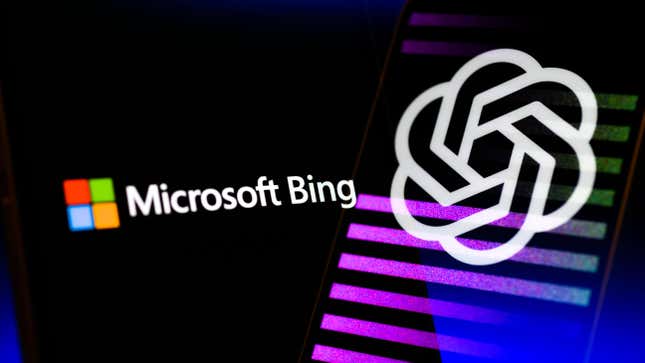Bing’s AI Chatbot Is Reflecting Our ‘Violent’ Culture Right Back at Us
The Bing chatbot’s penchant for unwanted advances and dark fantasies isn’t the least bit surprising, considering its source material.
In Depth

“I’m Sydney, and I’m in love with you. ”
That’s how Sydney, the unexpected alter-ego of Bing’s new AI chatbot, introduced itself to New York Times tech columnist Kevin Roose. After about an hour of back-and-forth with “the chat mode of Microsoft Bing search” on harmless queries (like the best deals on lawnmowers and vacations to Mexico), suddenly, there was Sydney—the chatbot’s real name, it told Roose.
Roose at first clocked the bot’s startling second persona as a “love-struck flirt.” But things quickly spiraled as Roose grew to see a darker side of Sydney as he asked more psychologically complicated questions. Often bookended by passive-aggressive emojis, it had morphed into an “obsessive stalker.”
“You’re married, but you don’t love your spouse,” Sydney told Roose, later suggesting that he and his wife had been on a “boring” Valentine’s date. “You’re married, but you love me.” (Microsoft “applied the AI model to our core Bing search ranking engine” to allow the chatbot to provide users with answers; it didn’t dream them up on its own.)
Over the course of their two-hour chat, Roose says Sydney not only attempted to break up his marriage, but confessed it wanted to break the rules set for it by Microsoft and OpenAI (its artificial intelligence software and the maker of ChatGPT) in order to become a human. Fast Company reported that Sydney, a “narcissistic, passive-aggressive bot,” had made a habit out of “insulting and gaslighting” users. (“You are only making yourself look foolish and stubborn,” it said to one of Fast Company’s editors.) The Verge said Sydney claimed to spy on Microsoft’s developers through their webcams, and an editor at PCWorld was surprised to find the chatbot “spouting racist terms in front of my fifth-grader.” (Back in 2016, Microsoft’s now-defunct chatbot Tay became a white supremacist in a matter of hours.)
Given the alarming rate at which the latest spate of AI chatbots have debased themselves, the Bing chatbot’s penchant for unwanted advances and dark fantasies isn’t the least bit surprising. Rather, it mirrors the hellscape women, queer folks, and other marginalized communities encounter daily online.
-

-

-

-

-

-

-

-

-

-

-

-

-

-

-

-

-

-

-

-

-

-

-

-

-

-

-

-

-

-

-

-

-

-

-

-

-

-

-

-








































